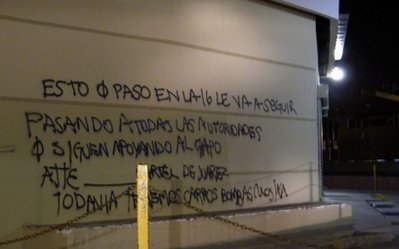This is a neat little deal that I wanted to put up as a Building Snowmobiles post. Partly because it is an innovation, and partly because it is a cheap solution used to defeat a cheap weapon. I also wanted to give some kudos to the troops who are out there and innovating and creating their own ‘snowmobiles’ to defeat the enemy.
With this tool, they can probe for wires in the ground from 26 ft away with a telescoping rod and a hook attached to the end. So for those scenarios where an IED emplacement is possible because the area is suspicious, an EOD specialist could probe for wires. When wires are found, he could cut them, and then the squad could follow both ends to the bomb and then to the IED team location. (please consult EOD or ‘those in the field’ first before using this tool, just so you know exactly how things are done!)
Now what would really be cool is for the innovator that thought this thing up, to come forward and claim some credit. Or at least give their invention a catchy name?
I also wanted to point out that innovations like this is something that happens out in the field due to analysis and synthesis, trial and error, and just plain old luck. This was not a solution that came from thousands of miles away, developed in some office by a company paid millions of dollars or by some government think tank. Nor was this innovation ‘ordered’ by some officer or higher command. Nope. Innovations like this come from individuals who are trying to survive and gain an edge on the battlefield. Their lives depend upon ‘finding the better way’, all so they can defeat the enemy and get back home alive. And this solution was cheap, simple, and effective…..perfect.
This is also the kind of thing that should be encouraged and rewarded by command and by today’s military. It should also be something that squad leaders and small unit leadership should encourage and seek out. The problem solvers of a squad should not be shut out, and a leader should do all they can to encourage innovations and discussions about innovations. A solution could come at any time, and from anybody, and leaders should be quick to jump on that gold and give that individual credit.
Ego or whatever you want to call it, has no place in this process (doom on those leaders that shut everyone out and propose that only ‘their’ ideas are the best) Use the creative juices of the entire team, include everyone in the process, and cheer that on as a leader. That is if you want to win, and in some cases, keep everyone alive and in one piece.
This particular innovation is just one example of how important ‘building snowmobiles’ can be to individuals who risk life and limb out there. Find the solution, no matter how crazy, how ridiculous, how radical, how funny, or whatever. Open your mind to the problem, and saturate/incubate/illuminate to find a solution. Get feedback and borrow brilliance. Avoid group think and confirmation bias. Question authority and the status quo. Use mimicry strategy. Stay focused and work on your Kaizen. Seek to destroy dogma and create a better plan/idea. (destruction and creation a la Boyd) Etc….
Pretty cool and bravo to the guy(s) who thought up this battlefield innovation. –Matt
Pikes Defeat Bombs
July 6, 2012: Given the incentives (life or death) it should come as no surprise that combat troops are very innovative in coming up with new battlefield tools.. One recent example was the development of an improvised “spear” for exposing and cutting wires the Taliban would use to set off roadside bombs. Three years ago, some soldier or marine (most likely the latter) figured out that one could take long (up to 8.4 meter/26 foot) fiberglass poles (normally used to help install communications or electrical wires), tape a sharp, curved blade to them and then use it to poke around an area possibly containing a roadside bomb detonating wire, without getting shot by the Taliban team waiting to set off the bomb. Once you found the wire, and cut it, you could find and disable the bomb itself. The Taliban detonation team would, by then either have run away, been captured or killed.
The manufacturer of the fiberglass poles, which come in three sections, became curious after more and more orders for the poles came from army and marine combat units in Afghanistan. These outfits normally did not do a lot of cable installation, and when asked what they were doing, the troops explained their innovative use of the poles.
As a bonus, the captured Taliban expressed great anger at their cleverly concealed bombs having been defeated by some poles with knives taped to one end. They expect more high tech from the American and don’t like being defeated by weapons any Afghan tribesman could build.
Story here.
—————————————————————
US troops score win against IEDs in Afghanistan
KIMBERLY DOZIER
July 6, 2012
Almost afraid to say it out loud, lest they jinx their record, U.S. troops in Afghanistan achieved one small but important victory over the past year: They found and avoided more homemade bombs meant to kill and maim them than a year ago, thanks to a surge in training, equipment and intelligence.

